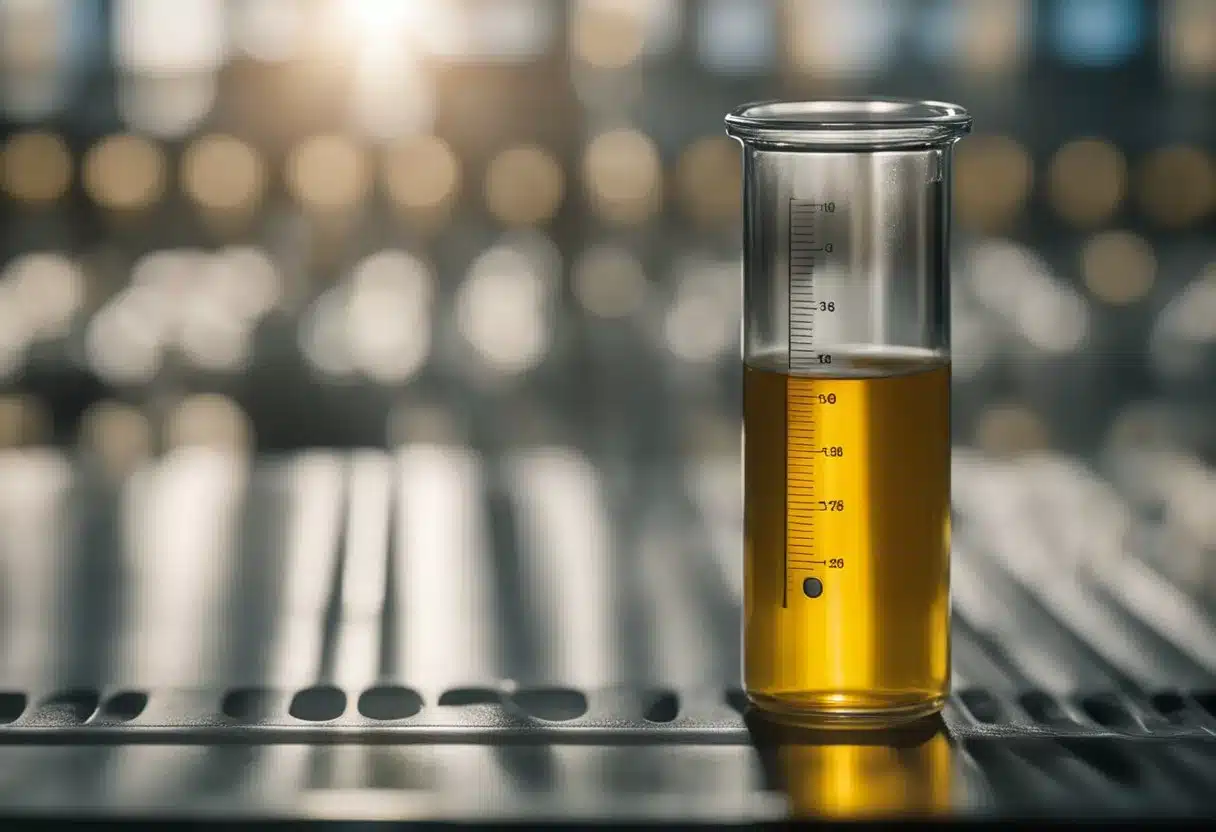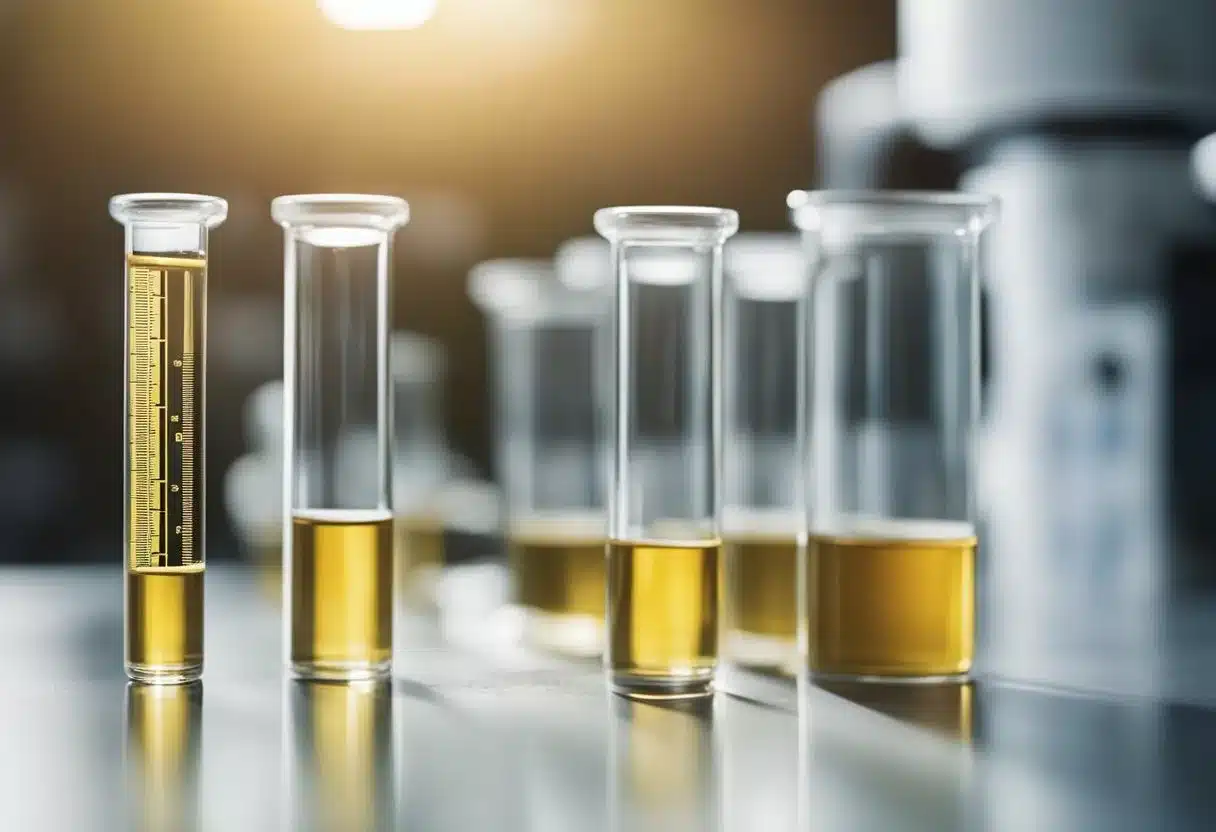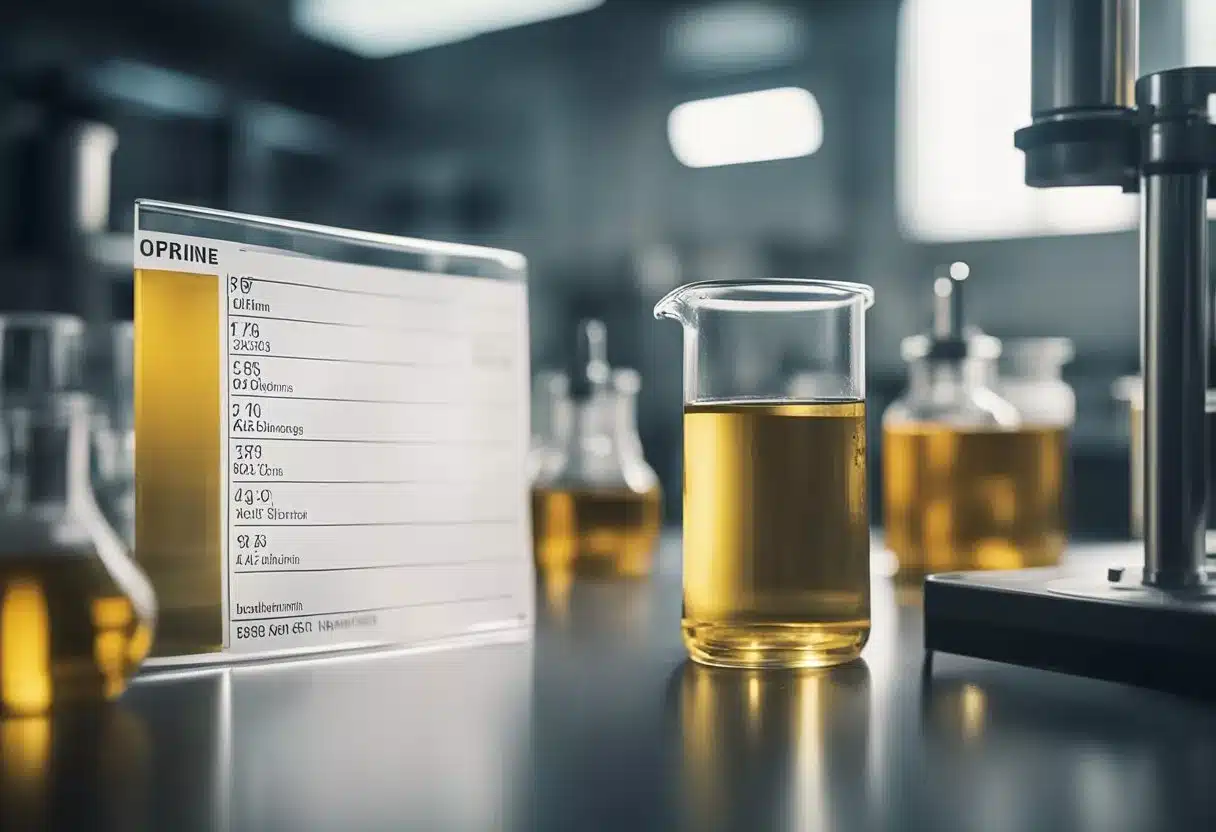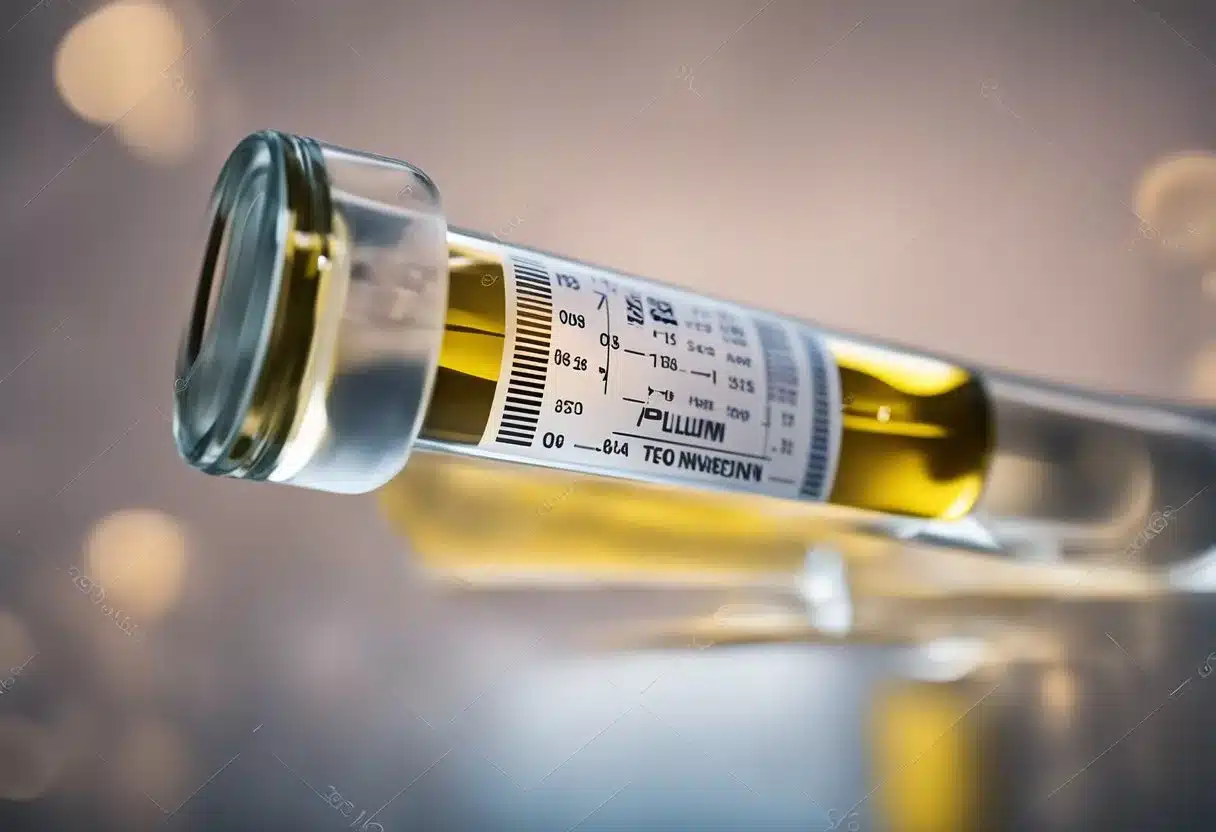Albumin in urine, also known as albuminuria, is a health concern that many people face. This condition occurs when the kidneys let albumin, a protein normally found in blood, pass into the urine. Having albumin in your urine can be a sign of kidney damage or other health issues.

When albumin shows up in urine, it may mean the kidneys aren’t working as well as they should. The kidneys usually filter waste from the blood while keeping important proteins like albumin inside the body. If these filters start to leak, albumin can escape into the urine.
Various factors can lead to albumin in urine, including high blood pressure, diabetes, and certain medications. Sometimes, it can be temporary due to things like exercise or fever. It’s important to get checked by a doctor if albumin is found in your urine, as it could point to a more serious condition that needs treatment.
Key Takeaways
- Albumin in urine can signal kidney problems or other health issues.
- High blood pressure, diabetes, and some medicines can cause albuminuria.
- Regular check-ups and urine tests help catch and manage albuminuria early.
Understanding Albumin in Urine

Albumin in urine can signal kidney problems. It’s important to know what albumin is and why it matters for kidney health.
Defining Albuminuria and Proteinuria
Albuminuria means having albumin in your urine. Albumin is a protein that shouldn’t be there. Proteinuria is a broader term for any proteins in urine.
Doctors check for albumin with a urine test. This test looks for small amounts of albumin called microalbuminuria. Finding albumin early can help spot kidney issues before they get worse.
Healthy kidneys filter waste but keep proteins in the blood. When kidneys are damaged, proteins like albumin can leak into urine.
Physiological Role of Albumin
Albumin is a key protein in our bodies. It does many jobs:
- Keeps fluid balance in blood vessels
- Carries hormones and vitamins
- Helps wounds heal
- Fights infections
Albumin is made in the liver. It’s the most common protein in blood plasma. When albumin shows up in urine, it means something’s not right with the kidneys.
Normal Protein Levels in Urine
A bit of protein in urine is normal. Healthy adults may have up to 150 mg per day in their urine. This small amount doesn’t show up on basic urine tests.
Microalbuminuria is when there’s a little more albumin than normal. It’s 30 to 300 mg per day. Anything over 300 mg is called macroalbuminuria.
Doctors use these levels to check kidney health:
- Normal: Less than 30 mg/day
- Microalbuminuria: 30-300 mg/day
- Macroalbuminuria: More than 300 mg/day
Regular urine tests can catch early signs of kidney problems. This helps doctors start treatment sooner.
Health Conditions Associated With Albuminuria

Albumin in urine can signal several health issues. It often indicates problems with the kidneys or other parts of the body. Let’s explore the main conditions linked to albuminuria.
Kidney Disease and Damage
Chronic kidney disease is a common cause of albuminuria. When kidneys are damaged, they can’t filter blood properly. This allows albumin to leak into the urine.
Kidney damage can happen slowly over time. It may not cause symptoms at first. That’s why doctors test urine for albumin regularly.
Family history can increase the risk of kidney problems. Some people are born with fewer working glomeruli, the kidney’s filtering units.
Diabetes and Its Complications
Diabetes is a major risk factor for albuminuria. High blood sugar levels can harm blood vessels in the kidneys.
Type 1 and type 2 diabetes can both lead to kidney damage. This is called diabetic kidney disease.
People with diabetes need regular urine tests. Early detection of albumin in urine can help prevent further kidney damage.
Controlling blood sugar is key to protecting the kidneys. Diet, exercise, and medication can help manage diabetes.
Cardiovascular Diseases
Heart and blood vessel problems can cause albuminuria. High blood pressure is a common culprit.
Hypertension puts extra stress on the kidneys. This can damage the kidney’s filters over time.
Heart disease and stroke are linked to albuminuria. The connection goes both ways. Kidney problems can increase heart disease risk.
Regular heart check-ups are important for people with albuminuria. Controlling blood pressure helps protect both the heart and kidneys.
Other Contributing Health Issues
Several other conditions can lead to albumin in urine. Urinary tract infections can cause temporary albuminuria.
Lupus, an autoimmune disease, can attack the kidneys. This may result in albumin leaking into urine.
Obesity increases the risk of albuminuria. Losing weight can help reduce this risk.
Some medications may cause albuminuria as a side effect. Always tell your doctor about all medicines you take.
Diagnosing Albuminuria

Diagnosing albuminuria involves specific urine tests to check for albumin levels. These tests help healthcare providers assess kidney function and detect potential issues early on.
The Role of Urine Testing
Urine tests are key in diagnosing albuminuria. A doctor may request a random urine sample or a 24-hour collection. The most common test is a dipstick test, where a strip changes color based on albumin levels.
For more precise results, labs measure the albumin-to-creatinine ratio (ACR). This test compares albumin to creatinine, another substance in urine. It gives a more accurate picture of albumin excretion.
Sometimes, doctors order a urinalysis. This test checks for other substances like glucose and blood cells. It can help identify other kidney or urinary tract issues.
Interpreting Urine Albumin Results
The albumin to creatinine ratio is used .to evaluate potential kidney damage. Normal albumin levels in urine are less than 30 mg/g creatinine. Levels between 30-300 mg/g indicate microalbuminuria. Anything above 300 mg/g is considered macroalbuminuria.
Here’s a quick reference:
- Normal: < 30 mg/g
- Microalbuminuria: 30-300 mg/g
- Macroalbuminuria: > 300 mg/g
An abnormal result doesn’t always mean kidney disease. Factors like exercise, fever, or dehydration can affect results. Doctors often repeat the test to confirm findings.
Monitoring and Progression
Regular testing helps track albuminuria over time. Doctors usually test yearly for people at risk. More frequent tests may be needed if levels are high.
The glomerular filtration rate (GFR) is another important measure. It shows how well kidneys filter blood. A lower GFR with higher albumin levels can indicate worsening kidney function.
Doctors use these tests to guide treatment. They may adjust medications or recommend lifestyle changes based on results. Early detection and monitoring can slow the progression of kidney damage.
Risk Factors and Prevention

Several factors can raise your chances of having albumin in your urine. Some are within your control, while others aren’t. Taking steps to prevent this condition can help protect your kidneys.
Identifying Risk Factors
Age plays a role in albumin in urine. As you get older, your risk increases. Family history matters too. If your relatives have kidney problems, you may be more likely to develop them.
High blood pressure is a major risk factor. It can damage blood vessels in your kidneys over time. Diabetes is another key risk. High blood sugar levels can harm kidney function.
Other factors include:
- Obesity
- Smoking
- Certain medications
- Heart disease
Dehydration and fever can cause temporary increases in urine albumin. These usually resolve when the underlying issue is addressed.
Preventive Measures
Regular exercise can help prevent albumin in urine. Aim for 30 minutes of activity most days. This helps control blood pressure and blood sugar.
Diet matters too. Eat foods low in salt and sugar. Choose lean proteins and plenty of fruits and vegetables. Stay hydrated by drinking enough water each day.
Controlling blood pressure is essential. Take blood pressure medication as prescribed. Monitor your levels at home if your doctor recommends it.
If you have diabetes, keep your blood sugar in check. Take your medications and follow your treatment plan. Regular check-ups with your doctor are important. They can catch problems early when they’re easier to treat.
Treatment and Management

Treating albumin in urine involves medications, lifestyle changes, and sometimes advanced procedures. The goal is to reduce protein loss and protect kidney function.
Medications and Healthcare Interventions
ACE inhibitors and ARBs are common medicines used to treat albumin in urine. These drugs help lower blood pressure and reduce protein leakage from the kidneys.
Your doctor may also prescribe drugs to control underlying conditions like diabetes or high blood pressure. Regular check-ups are important to monitor your progress and adjust treatments as needed.
Blood tests to check total protein levels help track how well your body is maintaining protein balance.
Lifestyle Adjustments and Diet
A healthy diet plays a key role in managing albumin in urine. Cutting back on salt and protein can ease the workload on your kidneys.
Staying active is vital. Regular exercise helps control blood pressure and blood sugar levels. Aim for at least 30 minutes of moderate activity most days of the week.
Working with a registered dietitian can help you create a meal plan that supports kidney health. They can guide you on which foods to eat and which to avoid.
Advanced Treatment Options
For severe cases, more intensive treatments may be needed. Dialysis is one option. It filters waste from your blood when your kidneys can’t do the job.
A kidney transplant might be considered for end-stage kidney disease. This surgery replaces a failing kidney with a healthy one from a donor.
These advanced treatments are typically used when other methods haven’t been effective in managing chronic kidney disease (CKD).
Frequently Asked Questions

Albumin in urine raises many questions about diet, symptoms, and treatment. These answers provide key information to help understand and manage this condition.
What dietary changes can help lower albumin levels in the urine?
A low-sodium diet can help reduce albumin in urine. Eating less salt helps lower blood pressure and puts less strain on the kidneys. Adding more fruits, vegetables, and whole grains is also good. These foods have fiber and nutrients that support kidney health.
Limiting protein intake may help in some cases. Too much protein can stress the kidneys. A doctor or dietitian can suggest the right amount of protein for each person’s needs.
What does the presence of trace albumin in urine indicate?
Trace amounts of albumin in urine may point to early kidney problems. It can be a sign that the kidneys aren’t filtering blood properly. This condition is called microalbuminuria.
Trace albumin doesn’t always mean kidney disease. It can happen due to exercise, fever, or stress. Regular testing helps doctors track if it’s an ongoing issue.
What is considered a normal range for urine albumin?
Normal urine has very little or no albumin. Less than 30 mg of albumin in a 24-hour urine sample is normal. A spot urine test should show less than 30 mg of albumin per gram of creatinine.
Higher levels may indicate kidney issues. 30-300 mg is considered microalbuminuria. Above 300 mg is macroalbuminuria, which is more serious.
What are the potential symptoms associated with trace levels of albumin in the urine?
Trace albumin in urine often has no noticeable symptoms. People usually don’t feel different or sick. That’s why regular urine tests are important, especially for those at risk of kidney problems.
If kidney damage progresses, symptoms may appear. These can include swelling in legs or feet, fatigue, and changes in urination habits.
Can lifestyle modifications contribute to decreasing microalbuminuria?
Yes, lifestyle changes can help reduce microalbuminuria. Regular exercise is beneficial. It can lower blood pressure and improve overall health. Aim for at least 30 minutes of activity most days.
Quitting smoking is vritical. Smoking harms blood vessels and can worsen kidney damage. Limiting alcohol intake is also helpful.
Maintaining a healthy weight supports kidney function. Losing extra pounds can reduce strain on the kidneys and lower albumin levels.
What are the treatment options for managing albumin in the urine?
Medications are often used to manage albumin in urine. ACE inhibitors and ARBs are common choices. These drugs help lower blood pressure and protect the kidneys.
Treating underlying conditions is key. This might include managing diabetes or high blood pressure. Good control of these issues can reduce albumin leakage.
Regular check-ups and urine tests are important. They help track progress and adjust treatment as needed. In some cases, referral to a kidney specialist may be necessary.